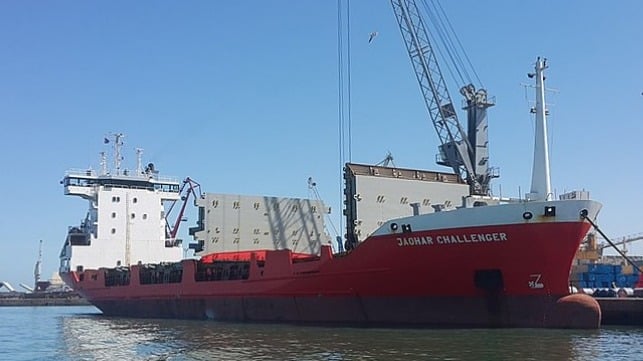Syrian-Owned Ship Banned from European Ports for Numerous Violations

The organization representing the European flag states took the unusual step of barring a cargo ship from calling at any of its ports. The Paris MoU on port state control said the action was mandatory because the vessel had been detained three times in the past 36 months.
The latest detention incident began on March 9 when the Jaohar Challenger arrived in the Italian port of Oristano. The 5,300 dwt vessel, which operates as a container feeder ship mostly in the Mediterranean, is reported by Equasis to be managed by the Jaohar Group with ownership interest believed to be held by a Syrian family. The ship is registered in Togo and operates with a Syrian crew.
The specialized Port State Control team of the Port Authority of Oristano carried out a control inspection aboard the vessel for verification of the safety conditions of the ship, the living and working conditions of the crew, and the protection of the marine environment from pollution.
In all, the Italian inspectors founded 17 issues that did not conform to the international codes, and 14 were reasons for the ship to be detained. Among the issues identified were problems with the alarms, cargo equipment, documentation, fire safety and lifesaving equipment, and pollution controls as well as structural issues related to the steering gear. The cleanliness of the engine room and working conditions for the crew was also rated insufficient.
In addition to warranting a detention, the authorities deemed the nature of the issues identified sufficiently serious to order additional checks. Inspectors working for the flag state ordered an additional inspection of the safety management system before the ship could depart the port.
While the Jaohar Challenger was able to clear the detention order and depart a week later on March 16, it was far from her first issue with flag state inspectors. Previously in Marina di Carrara, Italy, the vessel was detained for five days in October 2020 after inspectors found issues with the cargo equipment, life saving equipment, charts and even reported that parts of the radio system were inoperative for the reception of marine safety information. The month prior to that, the vessel was detained for one day in Alicante, Spain after inspectors identified issues with the manning, provision and quality of food, and sanitary facilities.
Prior to the three detentions, the vessel has a long list of deficiencies that had been listed by authorities in ports ranging from Italy to Spain, Russia, Romania, Algeria, Tunisia, Morocco, and Lebanon. The detentions however only began in 2020.
After departing Italy, the Jaohar Challenger sailed to Algeria where it currently remains at anchor. It is believed that she will be sailing to Turkey in the coming days.
According to the Paris MoU, under the regulations, the ship will be refused entry into all of the ports within the organization for three months because this was its third detention in a 36-month period. The ship will be refused further access to any port and anchorage in the Paris MOU region, except a port and anchorage of the ship’s flag state. The only exceptions would be for overriding safety considerations, or to reduce or minimize the risk of pollution, or to have deficiencies rectified.
While 32 ships had encountered detentions in the Paris MoU region in January and 45 ships in February, the total ban is an unusual occurrence. The previous ban related to a ship that also was found to have serious deficiencies and linger for six months at anchor in Bulgaria. While the Paris MoU issued a ban in January 2021, the vessel’s owners in this instance decided to send the vessel to the breakers in Turkey. In December 2020, the organization banned two other vessels while the prior bans happened in the spring of 2020.
According to the Italian authorities involved n this detention, their focus was to protect the safety of navigation and the marine environment and to prevent substandard ships that do not comply with the regulations.

that matters most
Get the latest maritime news delivered to your inbox daily.
(The photo is licensed under the Creative Commons Attribution-Share Alike 4.0 International license.)
